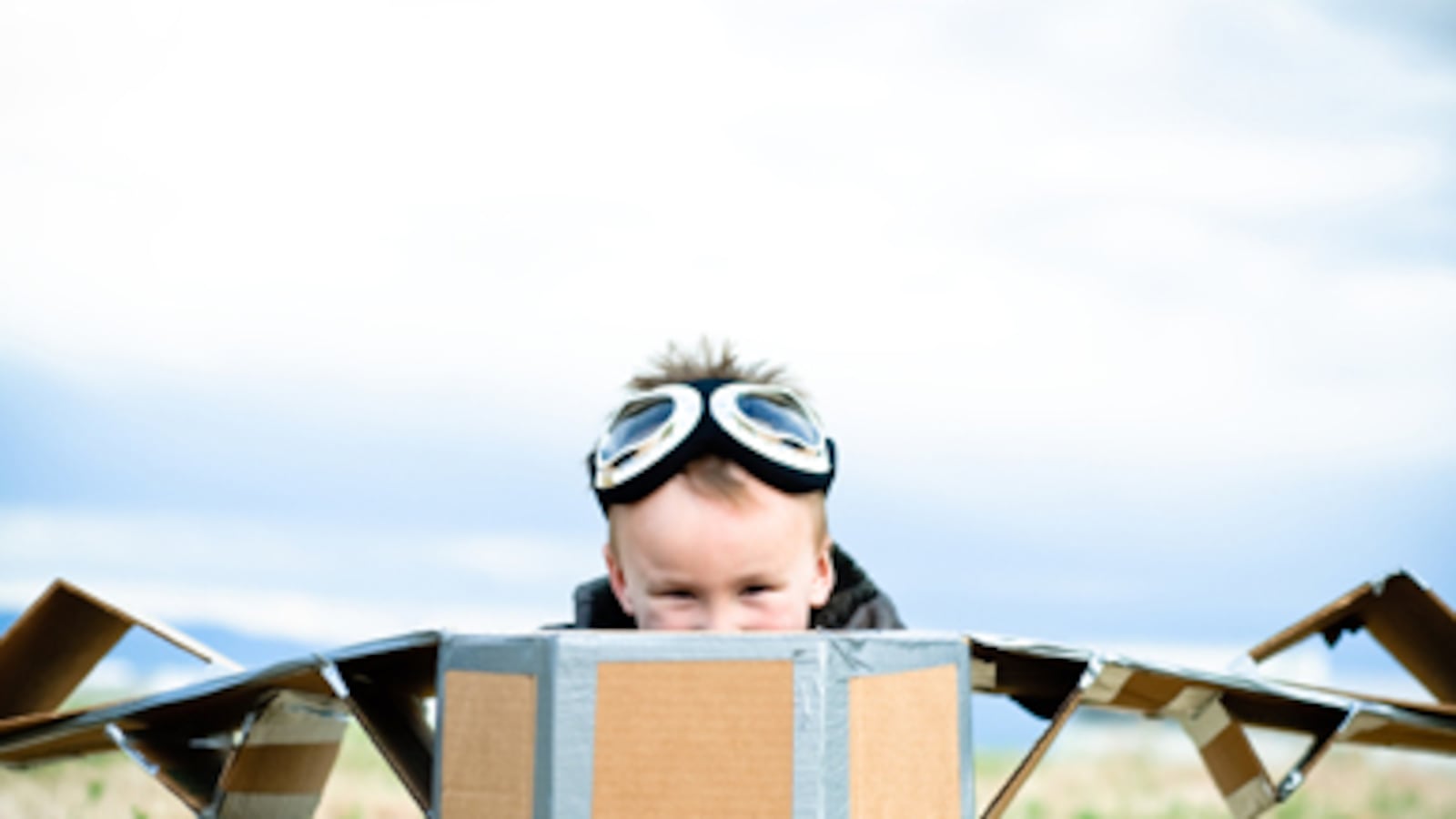When Zachary Hammond graduated from preschool, like many other toddlers he hadn't really developed an interest in academics quite yet. He was more into sports, playing street hockey and soccer. He could count to 50 and write his name, but he wasn't eager to learn to read. His class time was spent with worksheets, circling words that rhymed and identifying letters of the alphabet with memory games.
Zachary's younger brother, Maverick, on the other hand, finished preschool a few steps ahead. His drawing abilities flourished throughout his two years of pre-K, and he was even on the cusp of writing complete sentences. By that time, Zachary was beginning to read, and Maverick couldn't wait to learn, too. In Maverick's classroom, kids spent less time sitting at desks, and more often than not they could be found playing make-believe. Maverick's "education" is part of a growing wisdom that good old-fashioned play may be better than hitting the books.
Where once the model preschool or kindergarten lesson centered around a circle carpet and gaggle of curious toddlers, in recent decades desks, worksheets, a lecturing teacher, and even computers have been crowding into class time that traditionally focused on play. At its most extreme, some children are greeted by worksheets waiting for them at their desks. Though rare, there's the occasional classroom devoid of toys. Indeed, Maverick's preschool curriculum and others like it are "the exception rather than the rule," said Sheila Smith, director of the early childhood program at the National Center for Children in Poverty.
But a growing body of research supports the very real benefits of exploratory and playful learning experiences. A 2007 study published in Science evaluated a play-based program, Tools of the Mind, against a non-play-based one. After two years in the play-oriented classrooms, children scored better on self-regulation, cognitive flexibility, and working memory. The self-control kids learn through interacting and playing with others has an academic payoff, too; it's more strongly correlated with future academic success than either IQ or early reading and math skills. In Maverick's school, which was not part of the study, nearly 60 percent of the kids in the Tools program were able to write full sentences by the end of preschool, whereas with the previous curriculum only 5 percent of his fellow preschoolers could do so.
Two forthcoming studies in the journal Cognition show the extent to which direct, teacher-initiated learning can limit and dampen children's creativity and curiosity. In one study, when explicitly taught a singular way of playing with a new toy that had multiple facets, kids played with it for less time and fewer discovered its other features. However, another group of kids who were shown, as if by accident, the same feature of the toy were more likely to uncover new and different ways to play with it. A second study also showed that when children are instructed on how to do something, they tend to over-imitate or include superfluous actions.
Maybe the most important thing for parents to learn is that they can finally relax a little and let kids go back to doing what they do best.

"Learning from adults is fast tracking, rather than learning by trial and error," said Daphna Buchsbaum, an author on one of the studies. And here's where hyper-academics should take note: that fast-tracking can translate into limited problem-solving skills and diminished creativity, a dimension that some educators say we ought to be testing. In creativity tests, there's no single correct answer, but many.
To that end, Tools and similar play-oriented classrooms provide a variety of activity centers with simple props that can be manipulated in a variety of ways. Instead of battery-operated toys, there are boxes, sheets, logs, and building blocks. "If you give them simple building props, they will make what they need. The simpler the materials, the more they can be adjusted," said Deborah Leong, Tools' co-developer.
Worried that America's myopic focus on achievement has become destructive to their children's self-confidence, engagement, and well being, some parents are opting out of traditional education. Andrew O'Hehir has been writing at Salon about home-schooling his 6-year-old twins. Reluctant to put them in a school system that he and his wife perceive as dominated by "drill-based and scripted instruction and repetitious busywork," O'Hehir describes his family as part of a growing trend of secular home schoolers, motivated not by religious concern but by educational ones. Alternative education curricula are also gaining traction. Tools of the Mind has been adopted by 95 school districts, up from 25 four years ago. Enrollment in Waldorf schools, which emphasize fantasy play and where students spend their time baking, sewing, and gardening, has also increased in recent years.
Didactic teaching has come at the expense of play, which some say is no longer tolerated even for the youngest of students. A 2005 study found that the likelihood of expulsion was three times greater in preschool than in kindergarten through high school. Test prep, established as de rigueur for high school students aiming for the Ivy League, has found its way to the toddler set. Parents now pay top dollar to give their kids a head start in reading, writing, and math, whether the goal be a private kindergarten or ultimately a Harvard education. In these circles, it's not uncommon to enroll tots in private tutoring classes at the ripe young age of 3. Recently, a New York City mother sued her daughter's preschool for $19,000 in tuition, claiming that it failed to adequately prepare her 4-year-old for entry into the world of elite New York City private schools. In the suit, the preschool classroom was described disdainfully as "just one big playroom."
"'Play' has been kind of a dirty word in education for a while," said Edward Miller, a senior researcher at the Alliance for Childhood. "That's turning around." After decades of pushing kids to buckle down and learn more at ever-younger ages, we haven't gotten very far. The most recent Nation's Report Card showed no improvement in reading between 2007 and 2009 for fourth graders. And since 1998, eighth graders have hovered around the same levels.
America's obsession with "getting ahead" can be traced back to Sputnik, when the Russians beat the U.S. in the race to space. A 1983 report on the state of education, A Nation at Risk, was damning. It blamed "extensive student choice" for our " rising tide of mediocrity," and advocated for more homework, longer school days, and standardized tests, and called for "disciplined efforts."
Soon after, another problem had to be addressed—the literacy gap between the wealthy and the poor. The results of the National Reading Panel, a group tasked with reviewing the existing literature and research about literacy, recommended more explicit, systematic, and teacher-centered learning. But numerous studies have questioned the approach of early testing and literacy. One longitudinal study that compared low-income child-initiated preschool classes with teacher-initiated ones found that, by age 15, the latter group reported significantly more felony arrests and emotional problems.
"It's quite appalling that one or two years of the wrong type of preschool education can create such disastrous outcomes for children," said Joan Almon, executive director of the U.S. Alliance for Childhood.
Prior to the National Reading Panel "it was thought that young children, including those who had not been read to, would learn to read through free play," said James Griffin, who works at the Eunice Kennedy Shriver National Institute of Child Health and Human Development, which established the National Reading Panel. But play in schools doesn't mean a totally laissez-faire approach. Play advocates stress that the types of activities they're promoting aren't unstructured, and "mature, make-believe play" is key to kids developing self-regulation, Leong said. For instance, when kids participate in role-playing as part of a Tools classroom, there are rules. After they're assigned a role, there's a planning component. Kids draw their parts while the teacher writes them out. And for the duration of play, kids have to stick with the characters they were given.
Even with the best of intentions, it can be difficult to know what's right for our children. But with new research backing up the advantages of play, maybe the most important thing for parents to learn is that they can finally relax a little and let kids go back to doing what they do best.
Joyce Tang is outreach editor for The Daily Beast. Her work has appeared in Mother Jones and The Miami Herald.






